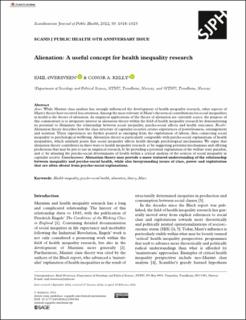| dc.contributor.author | Øversveen, Emil | |
| dc.contributor.author | Kelly, Conor Andre | |
| dc.date.accessioned | 2023-04-14T13:37:53Z | |
| dc.date.available | 2023-04-14T13:37:53Z | |
| dc.date.created | 2022-06-16T11:26:57Z | |
| dc.date.issued | 2022 | |
| dc.identifier.citation | Scandinavian Journal of Public Health. 2022, 50 (7), 1018-1023. | en_US |
| dc.identifier.issn | 1403-4948 | |
| dc.identifier.uri | https://hdl.handle.net/11250/3063180 | |
| dc.description.abstract | Aims:
While Marxist class analysis has strongly influenced the development of health inequality research, other aspects of Marx’s theory have received less attention. Among the most relevant of Marx’s theoretical contributions for social inequalities in health is the theory of alienation. As empirical applications of the theory of alienation are currently scarce, the purpose of this commentary is to invigorate interest in alienation theory within the field of health inequality research by demonstrating its potential to illuminate the relationship between social inequality, psycho-social affects and health outcomes.
Results:
Alienation theory describes how the class structure of capitalist societies creates experiences of powerlessness, estrangement and isolation. These experiences are further posited as emerging from the exploitation of labour, thus connecting social inequality to psychological wellbeing. Alienation theory is particularly compatible with psycho-social explanations of health inequalities, which similarly posits that social inequality affects health through psychological mechanisms. We argue that alienation theory contributes in three ways to health inequality research: a) by suggesting potential mechanisms and offering predictions that may be put to use in empirical research, b) by providing a potential explanation of the welfare state paradox, and c) by situating the psycho-social determinants of health within a critical analysis of the sources of social inequality in capitalist society.
Conclusions:
Alienation theory may provide a more textured understanding of the relationship between inequality and psycho-social health, while also foregrounding issues of class, power and exploitation that are often absent from psycho-social explanations. | en_US |
| dc.language.iso | eng | en_US |
| dc.publisher | SAGE | en_US |
| dc.rights | Navngivelse 4.0 Internasjonal | * |
| dc.rights.uri | http://creativecommons.org/licenses/by/4.0/deed.no | * |
| dc.title | Alienation: A useful concept for health inequality research | en_US |
| dc.title.alternative | Alienation: A useful concept for health inequality research | en_US |
| dc.type | Peer reviewed | en_US |
| dc.type | Journal article | en_US |
| dc.description.version | publishedVersion | en_US |
| dc.source.pagenumber | 1018-1023 | en_US |
| dc.source.volume | 50 | en_US |
| dc.source.journal | Scandinavian Journal of Public Health | en_US |
| dc.source.issue | 7 | en_US |
| dc.identifier.doi | 10.1177/14034948221085394 | |
| dc.identifier.cristin | 2032378 | |
| cristin.ispublished | true | |
| cristin.fulltext | original | |
| cristin.qualitycode | 1 | |

